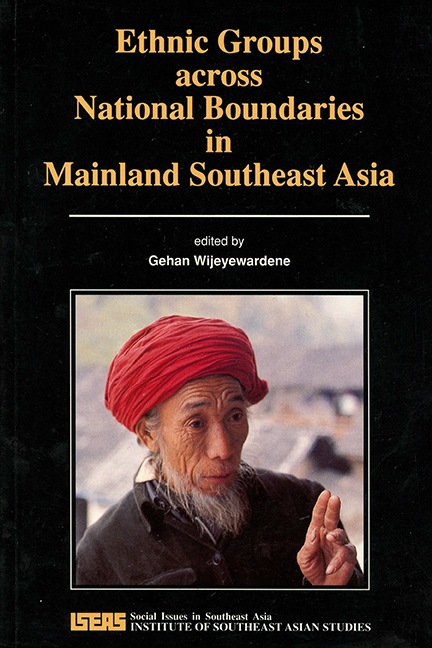Book contents
- Frontmatter
- Contents
- Foreword
- Contributors
- Acknowledgements
- 1 Introduction: Definition, Innovation, and History
- 2 Language and Ethnicity: The Mon in Burma and Thailand
- 3 Thailand and the Tai: Versions of Ethnic Identity
- 4 A Comparative Study of Structure and Contradiction in the Austro-Asiatic System of the Thai-Yunnan Periphery
- 5 Ethnicity, Nationalism, and the Nation-State: The Karen in Burma and Thailand
- 6 Capitalism and the Structure of Yao Descent Units in China and Thailand: A Comparison of Youling (1938) and Pulangka (1968)
- 7 Squatters or Refugees: Development and the Hmong
- 8 Afterword: “Ethnicity” and Anthropology
- Index
- THE EDITOR
4 - A Comparative Study of Structure and Contradiction in the Austro-Asiatic System of the Thai-Yunnan Periphery
Published online by Cambridge University Press: 21 October 2015
- Frontmatter
- Contents
- Foreword
- Contributors
- Acknowledgements
- 1 Introduction: Definition, Innovation, and History
- 2 Language and Ethnicity: The Mon in Burma and Thailand
- 3 Thailand and the Tai: Versions of Ethnic Identity
- 4 A Comparative Study of Structure and Contradiction in the Austro-Asiatic System of the Thai-Yunnan Periphery
- 5 Ethnicity, Nationalism, and the Nation-State: The Karen in Burma and Thailand
- 6 Capitalism and the Structure of Yao Descent Units in China and Thailand: A Comparison of Youling (1938) and Pulangka (1968)
- 7 Squatters or Refugees: Development and the Hmong
- 8 Afterword: “Ethnicity” and Anthropology
- Index
- THE EDITOR
Summary
Three Mon-Khmer-speaking ethnic groups are the subjects of this comparative study: the Lua (Thin) of Nan, the Laveue of northern Thailand, and the Wa of Yunnan. Let me begin by retelling a myth well known among several groups of Tai in the Thai-Yunnan periphery.
Once upon a time there lived five angels in Daowadueng Paradise who were tired of having been angels for so long. Seeing that there were still plenty of land, hills, plains, and trees on the earth unoccupied by humans they felt they should be born as humans and create civilization. Having made this decision, they transformed themselves into a tao pung (Northern Thai: a water gourd), and floated down from paradise to earth. As soon as the gourd landed on a mountain at Thung Na Tao (the “Water Gourd Field”) on the eastern side of Muang Thaeng, it exploded. Kha Tdjε? was the first-born man, Phu Thai Dam was the second, Lao Phung Khao the third. Haw the fourth, and Kaew the fifth. To each, from the gourd was also born a wife of the same race. After a while, they walked down together from the mountain and had their first bath and a drink at a stream, named Nong Hok Nong Hay, the water of which was believed to be sacred. All those who bathed and drank had their bodies clean and their minds clear, and were thus clever enough to rule the country. As the first-born Kha couple were afraid of cold water they did not bathe at Nong Hok Nong Hai, and all the Kha have remained black until now. … Therefore they owned no country.
This origin of the Kha and the “black” label was stamped on them not only by the Phu Tai of Muang Thaeng, as just related. Most Tai-speaking groups have reproduced for centuries the notion that the Kha were too stupid to rule the country.
- Type
- Chapter
- Information
- Ethnic Groups Across National Boundaries in Mainland SEA , pp. 74 - 101Publisher: ISEAS–Yusof Ishak InstitutePrint publication year: 1990

